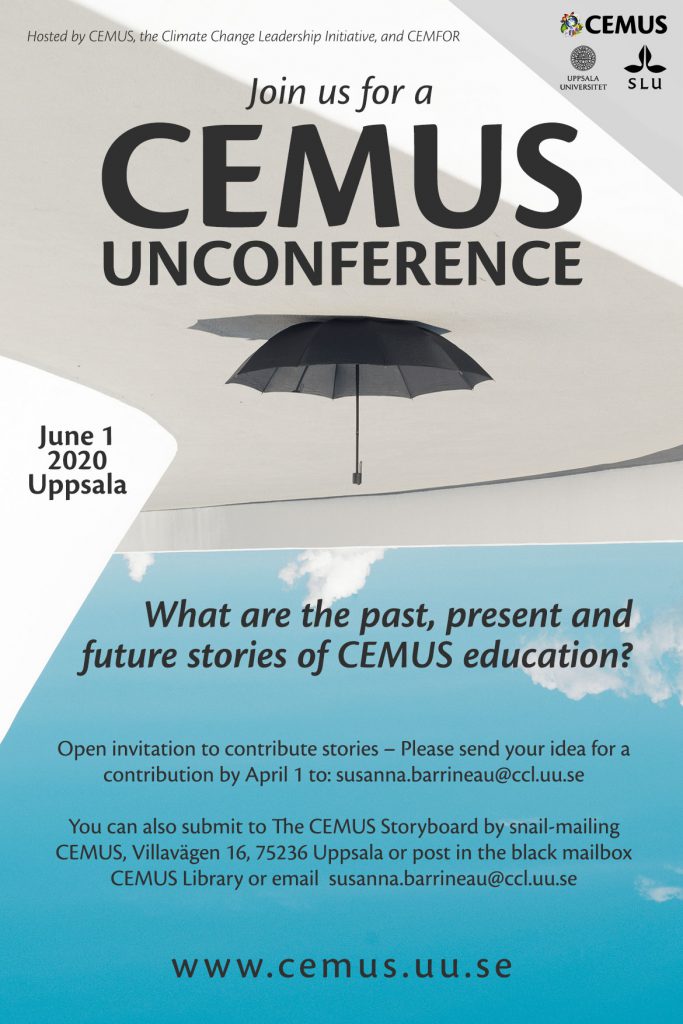The Unconference October 23 is cancelled. We are currently looking into ways of working with some of themes from the unconference in another format, check for updates at CEMUS webpage.
All the information below is not relevant any more – new updates coming!
Warmly welcome CEMUS Past, Present, Futures Unconference!
Hosted by CEMUS, the Climate Change Leadership Initiative, and CEMFOR
Open invitation to contribute stories – Please send your idea for a contribution by September 30 to: susanna.barrineau@ccl.uu.se
Date: October 23, 2020, kl. 8.30-16.30
Venue: Learning Lab 10:203 Uppsala University, Blåsenhus (max 25 seats with social distancing) and online via Zoom or Facebook live
Registration: http://doit.medfarm.uu.se/kurt16603
Book a ticket: Coming soon!
 CEMUS was founded to fill a crucial gap in university education, namely education that worked with the most challenging issues facing the planet. Based on a model of strong student leadership, students and academics together grappling with complex global challenges defined CEMUS at its inception. Over 25 years later, CEMUS education still offers interdisciplinary sustainability education and is a unique place in the university. This Unconference is an exploration into the deeper spirit of CEMUS, but also other types of sustainability education, and it is an invitation to ask the question How do we do meaningful education that allows people to address sustainability challenges? How does CEMUS do this at the moment? How do others do this? What can we learn from CEMUS history?
CEMUS was founded to fill a crucial gap in university education, namely education that worked with the most challenging issues facing the planet. Based on a model of strong student leadership, students and academics together grappling with complex global challenges defined CEMUS at its inception. Over 25 years later, CEMUS education still offers interdisciplinary sustainability education and is a unique place in the university. This Unconference is an exploration into the deeper spirit of CEMUS, but also other types of sustainability education, and it is an invitation to ask the question How do we do meaningful education that allows people to address sustainability challenges? How does CEMUS do this at the moment? How do others do this? What can we learn from CEMUS history?
By bringing multiple stories into dialogue, this gathering aims to create a rich conversation around the kind of educational practices that do, but also do not, support and enable learners to participate in contemporary and future sustainability challenges. Contributions in multiple formats are welcomed. The day will conclude with an open space activity hosted by Zennström Professor in Climate Change Leadership Keri Facer.
Invitation to contribute: We invite a broad range of experiences to be shared during the Unconference, and have theme suggestions below. Contributions may take any creative form that can take place in an indoor room; art installations, participatory workshops, short film viewings, presentations, etc. *for queries about hosting outdoor sessions, contact Sanna Barrineau (see below). Contributions are shared during sessions of ca 30-45 minutes, including time for questions/discussion. Sessions will be streamed for virtual participants, and we welcome completely virtual sessions as well.
For submitting a contribution, please include the following:
- Name of presenters
- No longer than 1 A4 page which covers: title, description of the theme you are addressing, short presentation of format (workshop, paper presentation, etc.)
Please send your idea for a contribution by September 30 to Sanna Barrineau:
susanna.barrineau@ccl.uu.se
Themes: We invite you to tell stories that speak to the following themes:
- Student leadership – When did/does it work well? What are the benefits? What are the drawbacks? What constitutes a sound enabling of student leadership and what constitutes unsound practices of free labour and how do you balance these tensions?
- Diverse perspectives – How far has Western education engaged with marginalised knowledge and perspectives? What role have more-than-human others played and what role will they play?
- University education – Is the university the right place to do climate and sustainability education today? What education do we need for the future? The university as a business is a condition of education; how is that condition handled and what are the outcomes? How do you stay disruptive when you are part of the university today?
- Learning & engagement – What does a pedagogy that is active and participatory look like? How are we preparing students to do engaged learning? So, you want your students to change the world – what preparation is required?
- Disruption – How radical can and should university education be?
